- Home
- Alyson Noel
Saving Zoë
Saving Zoë Read online
This is a work of fiction. All of the characters, organizations, and events portrayed in this novel are either products
of the author's imagination or are used fictitiously. SAVING Zoë. Copyright © 2007 by Alyson Noel. All rights reserved. Printed in the United States of America. No part
of this book may be used or reproduced in any manner whatsoever without written permission except in the case of
brief quotations embodied in critical articles or reviews. For information, address St. Martin's Press, 175 Fifth
Avenue, New York, N.Y. 10010.
www.stmartins.com
Library of Congress Cataloging-in-Publication Data
Noel, Alyson.
Saving Zoë /Alyson Noel.—1st ed.
p. cm.
Summary: Instead of a fresh start, high school provides more grief and isolation to Echo, whose older sister died
a year earlier, but insights gained from Zoë's diary—a fifteenth birthday gift from Zoë's boyfriend—about her sister's
life and death change Echo in ways she could have never expected.
ISBN: 978-1-4299-1858-9
1. Grief—Fiction. 2. Death—Fiction. 3. Sisters—Fiction. 4. Interpersonal relations—Fiction. 5. High
schools—Fiction. 6. Schools—Fiction. I. Title.
PZ7.N67185Sav2007
[Fie]—dc22
2007017445
For my sisters, Jolaine and Dori, and in memory of those who were taken too soon
Acknowledgments
I owe a huge debt of gratitude to: My readers, whose letters, e-mails, and posts to my bulletin board mean more to
me than they probably realize; Kate Schafer, who believed in Echo's story and is everything I could want in an agent
and more; everyone at St. Martin's Press, including but not limited to Matthew Shear, Jennifer Weis, Stefanie
Lindskog, Anne Marie Tallberg, and Abbye Simkowitz, for their support; my father, who gets to my book signings
early; and, as always, to Sandy, for everything.
One
They say there are five stages of grief:
1. Denial
2. Anger
3. Bargaining
4. Depression
5. Acceptance
Up until last year I didn't know there were lists like that. I had no idea people actually kept track of these things.
But still, even if I had known, I never would've guessed that just a few days before my fourteenth birthday I'd be stuck
in stage one.
But then you never think that kind of bad news will knock on your door. Because those kinds of stories, the kind
that involve a stone-faced newscaster interrupting your favorite TV show to report a crucial piece of "late breaking
news," are always about someone else's unfortunate family. They're never supposed to be about yours.
But what made it even worse is that I was the first to know.
Well, after the cops.
And, of course, Zoë
.
Not to mention the freak who was responsible for the whole mess in the first place.
And even though they didn't exactly say anything other than "May we please speak to your parents?" It was the regret on those two detectives’ faces, the defeat in their weary eyes, that pretty much gave it all away.
It was after school and I was home alone, trying to keep to my standard cookie-eating, TV-watching, homework-avoiding routine, even though I really couldn't concentrate on any of it. I mean, normally at 4:10 p.m. both
my parents would still be at work, my sister, Zoë, would be out with her boyfriend, and I would be sitting cross-legged on the floor, wedged between the couch and the coffee table, dunking Oreos into a tall glass of cold milk until my teeth were all black, the milk was all sopped up, and my stomach was all swollen and queasy.
So I guess in a way I was just trying to emulate all of that, go through the motions, and pretend everything was normal. That my parents weren't really out searching for Zoë, and that I wasn't already in denial long before I had
good reason to be.
But now, almost a year later, I can honestly say that I'm able to check off stages one through three, and am
settling into stage five. Though sometimes, in the early morning hours, when the house is quiet and my parents are
still asleep, I find myself regressing toward four. Especially now that September's here, putting us just days away
from the one-year anniversary of the last time Zoë shimmied up the big oak tree, climbed onto my balcony, and
came in through my unlocked french doors.
I remember rolling over and squinting against the morning light, watching as she pressed her index finger to her
smiling lips, her short red nail like the bottom of an upside-down exclamation point, as she performed her
exaggerated, cartoonish, stealth tiptoe through my room, out my door, and down the hall.
Sometimes now, when I think back on that day, I add a whole new scene. One where, instead of turning over
and falling back to sleep, I say something important, something meaningful, something that would've let her know,
beyond all doubt, just how much I loved and admired her.
But the truth is, I didn't say anything.
I mean, how was I supposed to know that was the last time I'd ever see her?
Two
When the woman at the funeral home, the one in the long floral dress, with the frizzy french braid, asked for a picture
of Zoë, my mom dropped her head in her hands and sobbed so hysterically that my dad pulled her close, clenched
his jaw, and nodded firmly, as though he was already working on it.
I stared at the toe of my black Converse sneaker, noticing how the fabric was wearing thin, and wondering
what that lady could possibly need a picture for. I guess it seemed like a weird request, considering how pretty much
everywhere you looked in our town you'd see a picture of Zoë. And since my sister was always so elusive and hard
to pin down in life, it seemed like I actually saw more of her after her disappearance than I had when she lived down
the hall.
First there were the two "missing person'7 flyers taped to just about every available surface. One a stiff, grainy,
black-and-white grabbed in a panic and copied from last year's yearbook. The other, one of Zoë's more recent
headshots, depicting her as beautiful, loose, and happy, more like the sister I knew, that also included a generous
reward for anyone with any information, no questions asked.
And then, as the days ticked by, her face started appearing just about everywhere—in newspapers,
magazines, and nationally televised news reports. Even the makeshift memorial, built by well-wishers and propped up
in front of our house, contained so many candles, poems, stuffed animals, angels, and photos of Zoë that it
threatened to take over the entire street until my dad enlisted a neighbor's help and hauled it all away.
The funny thing was, Zoë had always dreamed of being a model, an actress, someone famous and admired by
all. She longed for the day when she could escape our small, boring town, and go somewhere glamorous, like L.A.,
or New York, just someplace exciting and far from here. And so, while we were out searching, while we were busy smothering our doubt with hope, I played this kind of game in my head where I pretended that all of this was great
exposure for Zoë and her future as a famous person. Like it was the ultimate casting call. And I spent those long,
empty, thankless moments imagining how excited she'd be when she finally came home and saw her face plaste
red
all across the nation.
But then later, in the mortuary, as I watched my parents make the world's most depressing arrangements,
encouraged into credit card debt by the man in the stark black suit who guided them toward the most luxurious
casket, the most abundant flowers, and the whitest doves—sparing no expense at her memory—I sat wide-eyed,
realizing the lucrative business of loss, while wondering if my mom got the irony behind Zoë's ambition and the
woman's request, and if that's why she was crying so hard.
But then, I guess there were millions of reasons to cry that day. So it's not like I had to go searching for The
One.
I didn't know why that woman wanted a photo, but I doubted my dad, grief stricken and distracted, would ever
remember to give her one. So after they'd signed away their savings and were headed out the door, I reached into
my old blue nylon wallet, the one with the surf brand sticker still partially stuck to the front, its edges frayed and curled
all around, and retrieved the photo Zoë had given me just a few weeks before, the one that showcased her large
dark eyes, generous smile, high cheekbones, and long wavy, dark hair. The one she'd planned to send to the big
New York and LA agencies.
"Here," I said, pressing it into the woman's soft, round hand, watching as she did the quick intake of breath I
was so used to seeing when confronted with an image of Zoë for the very first time.
She looked at me and smiled, the fine lines around her blue eyes merging together until almost joining as one.
"I'll be doing her makeup, and I want to get it just right. So, thank you—" She left that last part dangling, looking
embarrassed that she knew all about my loss, but didn't know my name.
"Echo." I smiled. "My name is Echo. And you can keep the picture. Zoë would've liked that." Then I ran outside
to catch up with my parents.
three
Zoë and Echo are Greek names, even though we're not at all Greek. Zoë means life, and Echo, well, I know you
know what it means, so I'll just say that it's also a nymph who pined away for some guy named Narcissus until
nothing was left but her voice. Which is something, by the way, that I would never do. You know, fade away over
some guy. I mean, not even Chess Williams, the cutest guy in my class since fourth grade, is worth crumbling for.
Anyway, it's basically a Greek mythology thing, and I guess that's why we got names like that. Nothing to do with
nationality, and everything to do with academics.
My parents are big on academics. Which I guess is why they're both professors. And, knowing I'll risk looking
like a total brainiac nerd, I'll just go ahead and admit, right now and for the record, that I'm pretty big on academics
too. But Zoë? Zoë hated all that. She was beautiful, and wild, and too busy getting into trouble and sneaking out of
the house to ever slow down long enough to actually finish a book. Yet she was so sweet about it, and had such
uncontained enthusiasm (for everything but homework), that no one ever held a grudge or judged her too harshly.
"Life is too exhilarating to read about! You gotta get out there and live it!" she'd say, just moments before
sneaking onto my balcony and down the old oak tree, as I lay in bed reading one of my numerous library-issued
novels.
But I'm nothing like Zoë. I'm average, not beautiful. I mean, my hair is medium brown and kind of limp, not rich
and wavy like hers. And where she had amazing dark eyes with extra-thick long lashes, mine are light hazel, which
may sound nice on paper, but believe me, they're far more functional than special. And my body, well, I'm really,
really hoping that the years between fourteen and sixteen will be as kind and generous to me as they were to her
(though so far, I'm a couple weeks shy of fifteen and there's nothing to report). And I've definitely never been in any
kind of trouble. Well, at least not the serious kind. I mean, so far my biggest offense is returning a library book two weeks late because I liked it so much I decided to read it again.
But Zoë? Well, let's just say that had she actually made it home that day, she would've been in for it big time.
"Echo?" my mom calls from the bottom of the stairs. Tm leaving. Are you sure you don't need a ride?"
"Nope. Have a good day." I peek around my bedroom door, catching a quick glimpse of her as she heads
outside before locking all three dead bolts, even though I'll be leaving in less than two minutes.
But that's how we live now, overly cautious, verging on completely paranoid. And it took a solid fifty-five minutes
of carefully argued debate, during last night's meatloaf, steamed asparagus, and garlic mashed potatoes dinner to
get both of my parents to let me walk to school, as opposed to getting door-to-door service from one of them.
And it's not like I'm going it alone or anything, since all I have to do is go halfway down the block to my best
friend Abby's, before we both stop on the corner to pick up our other best friend, Jenay.
Though I guess it's pretty much a miracle my mom decided to go back to teaching in the first place. I mean,
right after everything happened she took a sabbatical so she could stay home and "look after me." I guess my
parents blamed themselves for what happened. Thinking that their busy, working lives didn't allow for the kind of
constant vigilance required to protect us.
But really, how much can you actually protect someone before it turns into imprisonment? Because just a few
months into it, that's exactly how I started to feel, like a prisoner in my own home. I mean, at first I thought it would be
nice to spend more time with my mom, especially after what we'd all just been through, but it didn't take long before
she started acting more like a warden. And all she required of me was to go to school, come straight home, not to
talk too much, and never to venture past the front door without:
A valid reason and detailed explanation containing
all of the whos, hows, whys, and wheres
&
an approximately exact ETA and ETD.
But none of that would've been so bad if I hadn't been so lonely. I mean, Abby and Jenay didn't come over
nearly as much as you'd think. Mostly because their parents wouldn't let them, always mumbling some excuse about
our family "needing our space during our difficult time." But I knew that wasn't the reason.
It's like when something really horrible and tragic happens, pretty much everyone starts giving you these sad,
regretful looks as they slowly back away. Like our tragedy was contagious. Like our once warm and inviting home
was now a place of darkness and doom, where extreme caution was clearly warranted.
So basically, all last year, when I wasn't at school, I was pretty much alone. I mean, my mom mostly stayed curled up on the couch, clad in her old blue terry cloth robe, staring blankly at the TV, tears pouring down her cheeks,
while my dad lingered at work, staying later and later, and only rarely making it home before my bedtime.
And the weekends? Well, that's when they argued. Hurling accusations back and forth like blows in a boxing
match, never tiring of their need to prove, once and for all, just who was more responsible for what happened to Zoë.
I used to think that tragedy brought people closer. But now, from everything I've experienced, I know it pretty
much tears them apart.
Then again, all of that happened before my mom started taking her "happy pills," which enabled her to get off
the couch, out of her robe, and back to work.
The fighting stopped too. Only to be replaced with a flood of formality
and excessive politeness, like we're all just strangers on a cruise ship, forced to eat our meals together, and act like
we're interested.
And even though on the surface we seem to be doing better, the truth is my dad still "works" late, and my
mom's eyes are more vacant than ever.
And as much as I miss Zoë, as much as my heart aches, as much as I'd do anything in the world just to get her
back, there are times when I actually hate her too. Because this is what she's done to me. This is what she's left me
with. Two broken, deeply suspicious, hollowed-out shells for parents, and the morbid curiosity of everyone I
encounter.
Tucking my hair behind my ears, I grab my backpack, run down the stairs, lock all three locks, and head toward
Abby's. But before I'm even halfway there, I see her heading toward me.
"Hey," she says, her long black ponytail swinging from side to side as her face breaks into a smile, exposing
the blue metal braces she can't wait to get off, as her brown eyes squint against the sun.
11 Am I late?" I ask, glancing at my watch, then back at her.
"I'm early. Aaron's driving me crazy, so I bailed," she says, shaking her head and rolling her eyes as we head
toward the corner where we'll pick up Jenay. Abby's brother Aaron is two years younger and pretty much the bane of
her otherwise extremely orderly existence.
"What's up with Aaron?" I ask.
"What isn't up with Aaron?" She shakes her head again. "He bugs me so bad, sometimes I wish he'd just
disappear, never to return. Then I'd have some peace. I mean, just this morning—" Suddenly she stops walking,
stops talking, and just stands there, gaping at me, her mouth hanging open, her brown eyes full of sorry and regret.
"Oh God, I didn't mean—"
"It's okay," I say quickly, forcing my face to smile. "Seriously. So you were eating breakfast and..." I loop my
arm through hers, leading her toward the corner, and hopefully away from her guilt. Everyone is always apologizing to me now, and sometimes I wonder if it will ever stop.
"And there's Jenay," she says, deftly changing the subject. "Omigod, are those—? Oh man, she is so lucky!

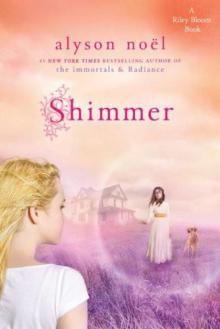 Shimmer
Shimmer Art Geeks and Prom Queens
Art Geeks and Prom Queens Radiance
Radiance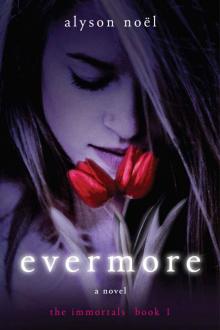 Evermore
Evermore Echo
Echo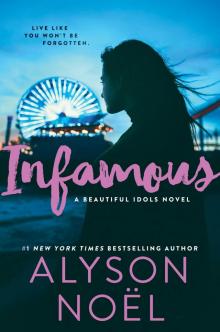 Infamous
Infamous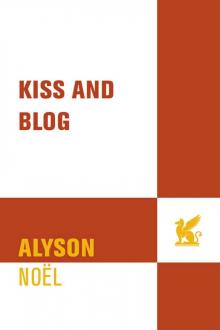 Kiss & Blog
Kiss & Blog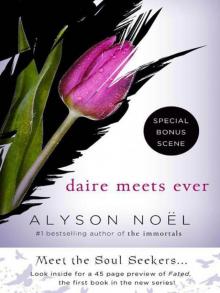 Daire Meets Ever
Daire Meets Ever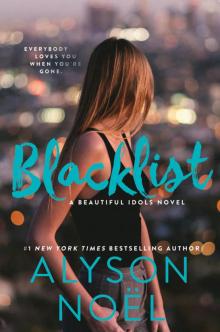 Blacklist
Blacklist Blue Moon
Blue Moon Shadowland
Shadowland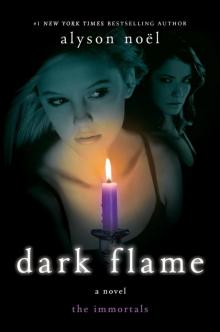 Dark Flame
Dark Flame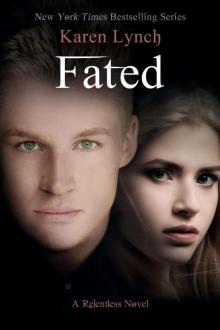 Fated
Fated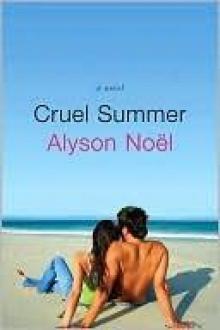 Cruel Summer
Cruel Summer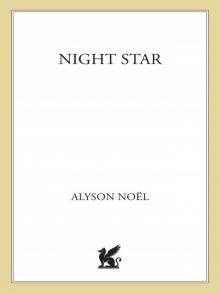 Night Star
Night Star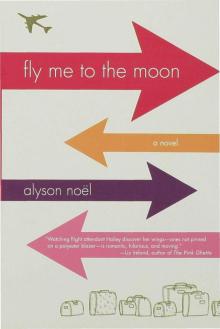 Fly Me to the Moon
Fly Me to the Moon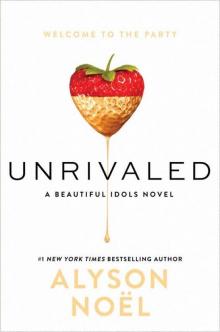 Unrivaled
Unrivaled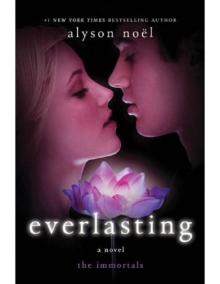 Everlasting
Everlasting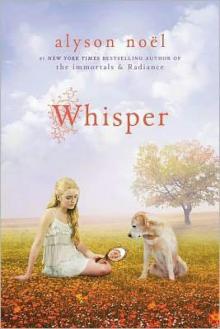 Whisper
Whisper Echo (Soul Seekers)
Echo (Soul Seekers)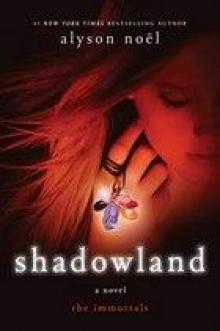 Shadowland: The Immortals
Shadowland: The Immortals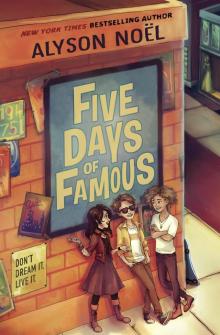 Five Days of Famous
Five Days of Famous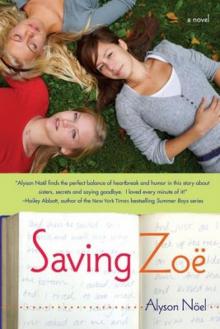 Saving Zoe
Saving Zoe Dreamland
Dreamland The Soul Seekers: Horizon
The Soul Seekers: Horizon Keeping Secrets
Keeping Secrets Shimmer rb-2
Shimmer rb-2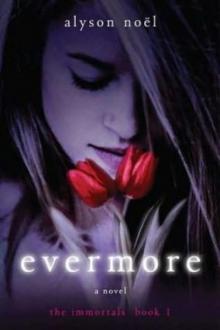 Evermore ti-1
Evermore ti-1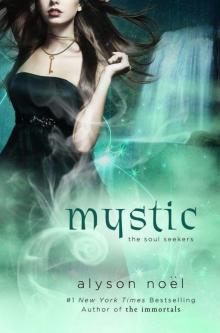 Soul Seekers03 - Mystic
Soul Seekers03 - Mystic Laguna Cove
Laguna Cove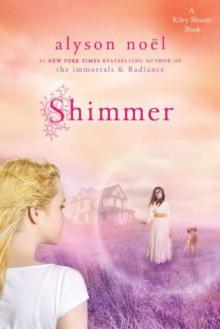 Shimmer: A Riley Bloom Book
Shimmer: A Riley Bloom Book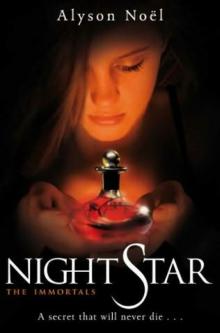 Night Star ti-5
Night Star ti-5